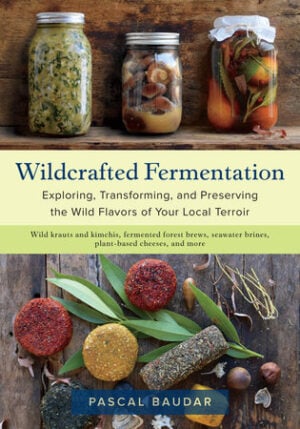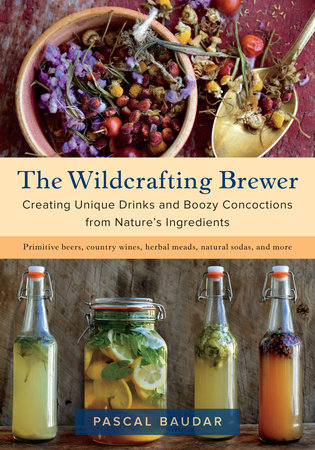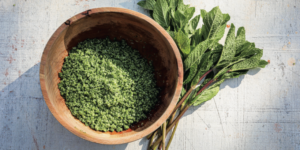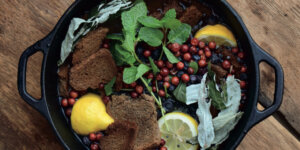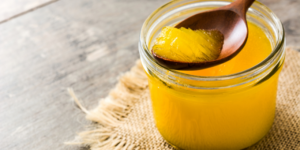Wild Spicy Forest Paste
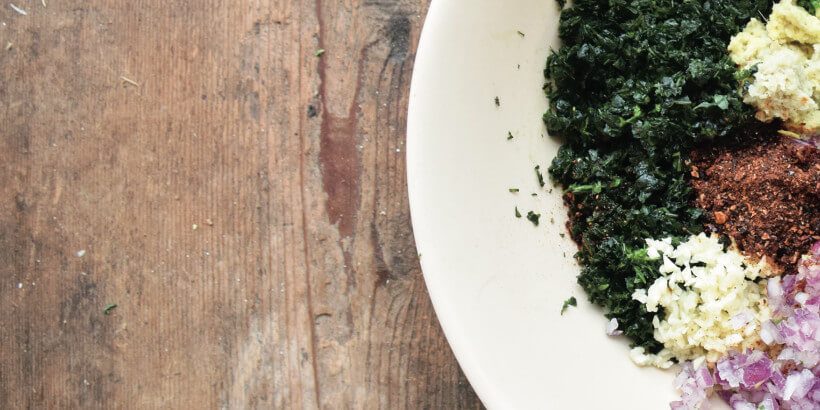
In his new book Wildcrafted Fermentation, professional forager Pascal Baudar combines his curiosity, research, and in-depth understanding of terroir to explore new and surprising uses for wild ingredients through fermentation.
The following is an excerpt from the Chelsea Green Spring 2020 Seasonal Journal. It has been adapted for the web
Springtime offers an abundance of delicious and tender wild greens such as chickweed, miner’s lettuce, wild chervil, tender young grass (foxtail), watercress, bitter cress, and countless others. Eating a freshly foraged salad is truly an epiphany of green flavors in your mouth: earthy, a punch of chlorophyll, grassy, the perfect balance of sweet and bitter. You cannot even approach those flavors with ingredients purchased at the store. And they can be preserved for use year-round in the form of pastes.
Spicy Forest Paste
I usually serve this paste on top of my acorn and wild seeds crackers, but it will work nicely on eggs, grilled steaks, and even fish. If your diet is plant-based, I would spread the paste on vegan pizza or simply use it as a savory side condiment.
Ingredients
Makes a ½-pint jar (236 ml)
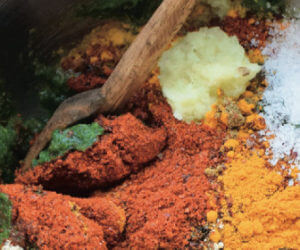
Image from Wildcrafted Fermentation
- 2 large jalapeño peppers, seeds removed, cut into large pieces
- 2 ½ cups (75 g) minced forest herbs (I use 60 percent chickweed, 20 percent chervil, 10 percent miner’s lettuce,10 percent others)
- 1 cup (30 g) lemon basil
- 1 cup (30 g) cilantro
- 7 garlic cloves, peeled
- 2 tablespoons (30 ml) Culture Starter
- 4½ tablespoons (27 g) paprika
- 2 tablespoons (15 g) Korean chili flakes
- ¾ teaspoon (2 g) ground coriander
- 1 teaspoon (2.5 g) chile morita or spicy chili flakes
- ¾ teaspoon (1 g) ground cumin
- 2 teaspoons (4 g) ginger powder or 1 tablespoon (5 g) grated fresh ginger root
- 1 teaspoon (3 g) garlic powder
- ½ teaspoon (1.5 g) ground black peppercorns
- 1 teaspoon (2 g) turmeric
- Salt
Procedure
- Process the jalapeños, forest herbs, lemon basil, cilantro, garlic, and starter in a blender until you get a smooth paste.
- Place this in a bowl, and add the spices, stirring to combine.
- Mix the salt with the paste and transfer to a jar.
- Close the lid and stir the ferment a couple of times daily until the fermentation gases subside, usually 7 to 10 days. You’ll need to burp as necessary.
Recommended Reads
Recent Articles
Unwind with a twist! Ditch the booze and elevate your evenings with this delightful herbal nightcap mocktail syrup. Relax before bed or spice up your tea time!
Read MoreSearching for a new way to utilize seasonings? Shake up your cooking routine with a fresh twist on salt and seasonings. Introducing… Mint Salt Recipe!
Read MoreWarm up from the inside out with Fire Cider! Great for stimulating digestion and warming you up from the inside out, no matter the season. It can be prepared in water or tea as desired.
Read MoreReady to shake up your fermentation game? Try making Kvass, the ultimate beginner-friendly recipe! This nourishing beverage calls for just a few simple ingredients and only takes a couple of days to ferment. It’s easy, delicious & perfect for beginners.
Read MoreStart your journey to making homemade ghee! Discover how to make this delicious staple and incorporate it into delicious recipes — like our Citrus-Glazed Chicken recipe. Get ready to level up your cooking game with homemade ghee!
Read More

